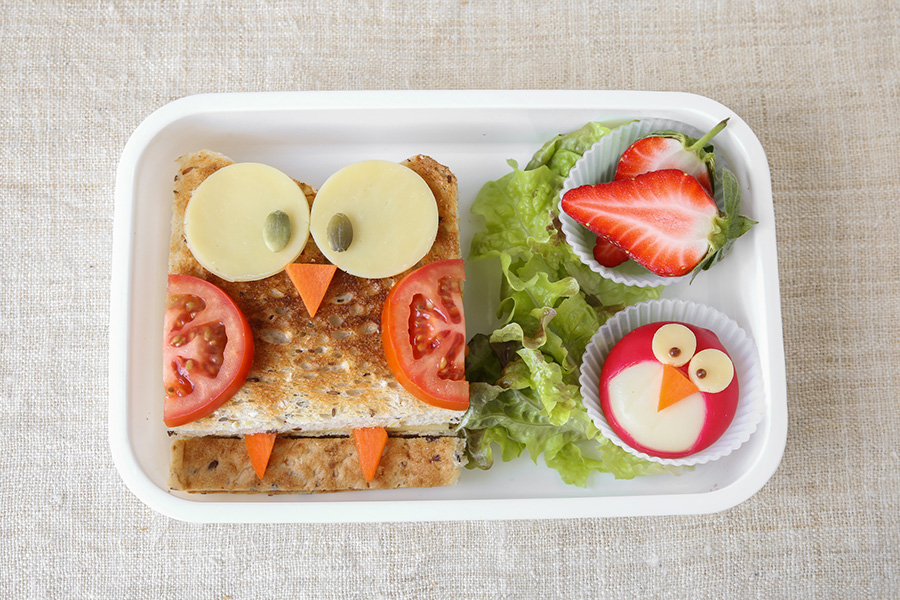Beyond the Plate
For many kids who come through the doors of Children’s Home Society (CHS), food can be complicated, filled with uncertainty and sometimes painful memories. But once a month, something special happens at Sioux Falls Children’s Home’s Loving School. Elli Nyberg walks into the classrooms carrying more than just snacks—she brings stories, science experiments and life skills that can be used long after their time at CHS.
 Each month, Elli leads hands-on nutrition education in every classroom. She doesn’t just teach students what a balanced plate looks like or how to eat healthier, she also shows them how to take care of themselves in ways they may never have been taught. Through her lessons, Elli models positive food habits, helps build confidence and sparks curiosity, especially in children who may not have a healthy relationship with food.
Each month, Elli leads hands-on nutrition education in every classroom. She doesn’t just teach students what a balanced plate looks like or how to eat healthier, she also shows them how to take care of themselves in ways they may never have been taught. Through her lessons, Elli models positive food habits, helps build confidence and sparks curiosity, especially in children who may not have a healthy relationship with food.
While the students know her as the fun “nutrition teacher” who brings snacks and cool activities, Elli is also a registered dietitian, the owner of Comprehensive Nutrition Solutions and a longtime instructor at CHS.
Elli Nyberg, Registered Dietitian
“I’ve been teaching classes here for 18 years, and I haven’t repeated anything except one series that I do,” she laughed. “It's a nutrition story with a little dragon—I think it’s super cute. But otherwise, every lesson I’ve taught is new.”
Elli’s journey into the classroom began with a routine nutrition assessment for a new child at CHS. When she asked what they had eaten at home, the five-year-old replied that they had eaten frozen pizza. Elli questioned how it had been cooked.
“I asked him, ‘How did you cook it?’ He told me that he was just so hungry and there wasn't anyone around, so he ate it frozen,” said Elli. “I sat back in my chair and thought, this can’t be happening. I had to teach these kids how to safely prepare food if they were ever left alone.”
She began researching existing curricula, but even the most basic lessons were still too complicated for the middle schoolers. So, she decided to create her own. Armed with a bag of eggs and a borrowed microwave, she stepped into her first class. And the first lesson? Microwave and kitchen safety.
Elli kept the first lesson simple, going over how to use microwave-safe dishware, how to avoid starting a fire and tips on kitchen cleanliness. Then came the fun part. Elli pulled out containers of eggs and told the class that today’s snack would be scrambled eggs. She demonstrated how to crack an egg—something most had never done before—and then let them all take turns practicing.
From there, the  snacks grew to no-bake energy bites, pizza bagels and other recipes that didn’t require an oven but relied on basic cooking skills, like measuring and swapping ingredients.
snacks grew to no-bake energy bites, pizza bagels and other recipes that didn’t require an oven but relied on basic cooking skills, like measuring and swapping ingredients.
“The convenience of fast-food, sit-down restaurants and food delivery services has taken away cooking opportunities in the home,” she said. “Food preparation is not being modeled in the home very well anymore. This is something we are seeing all over the country, not just at CHS.” Kids love making the recipes Elli brings in. Pizza bagels were a huge win!
To help reinforce her lessons, Elli created simple take-home recipe cards. Students collect them and build a personalized cookbook that they can take with them when they leave CHS.
“One of the things we made was a pizza bagel. I told them, ‘Sometimes people don't have bagels in their house,’” she explained. “So, we brainstormed substitutes. The kids came up with tortilla shells, bread, crackers—you name it. They leave knowing how to adjust a recipe.”
Loving School Principal Ericka Bohle agrees that the cookbooks are a powerful tool for helping the kids retain what they’ve learned.
“While it’s not a formal cookbook, Elli makes sure each child gets printouts of the recipes they create together,” said Ericka. “These recipes are realistic, kid-friendly and simple enough to make at home.”
From Pre-Test to Impact
Elli isn’t just a teacher—she’s also a student pursuing her PhD. Her experience at CHS has become the inspiration for a research study she plans to publish.
To measure the students’ progress, she developed a short and simple pre- and post-test, asking two questions:
- Do you know how to read a recipe?
- Do you know how to measure ingredients?
“It wasn’t anything fancy,” she said. “I asked the two questions at the beginning of the school year, and again at the end of the year. The increased number of hands that were raised was awesome to see.”
The data she collected is now part of a manuscript—that is currently under academic review—and the early findings are powerful. Students showed significant gains in nutrition knowledge and food-handling confidence. Even BMI scores have improved.
“The BMI improvements were statistically significant,” said Elli. “Every child in the overweight and obese category moved down at least one percentile, if not completely came into the normal range. We have very few kids who are underweight, but even those children came up to the normal range. I believe it’s fair to say that their nutrition status has improved and these classes matter.”
For the Principal, the data simply confirms what she is already seeing in her students.
“These monthly nutrition classes are important because they help students build healthy habits, support growth and learning, and prepare them with practical life skills for the future,” said Ericka. “Elli’s lessons reinforce how food impacts energy, focus, and behavior, giving kids tools to make better choices for their health and emotional regulation.”
Taste, Try and Trust
Not every lesson teaches only nutrition facts. In fact, many of Elli’s classes also involve communication and trust. For kids with food trauma histories or sensory challenges, just having a new food on a plate in front of them can be overwhelming.
“I never pressure them to eat anything I bring in,” said Elli. “But I’ll try to get them to smell it or encourage them to touch it and pick it up. Eventually, they try it and a few months later, they'll be asking, ‘What'd you bring for snack today?’ It's rewarding to see that progress.”
Her snacks aren’t just a standard apple or banana. Instead, Elli often ties her lessons to national food holidays or brings unfamiliar fruits and vegetables. She’ll even take the time to show a short video about the food—how something is harvested, or where it comes from—but it’s all part of her farm-to-table approach.
“I grew up on a farm,” she said. “Most of our kids at CHS are ‘city kids’ and they’ve never seen where food really comes from.”
Ericka agrees that these things are important for the kids to learn and commends Elli on making her content engaging for all the kids.
“Elli introduced a cow named Lady Holly to teach about vitamin D and where milk comes from,” said Ericka. “She consistently brings engaging materials that help students understand the content in a fun, age-appropriate way.”
In addition to food prep, Elli teaches kitchen hygiene, table manners and how to safely handle common kitchen utensils. She’s noticed in a few of her dining hall audits that many children don’t know how to cut food with a knife or open their milk cartons.
“We practice ‘please’ and ‘thank you,’ how to hold a knife and fork, how to stir without sending a bowl flying across the room,” she laughed. “It sounds simple, but no one’s ever taken the time to show them how.”

One favorite activity among the students was when Elli brought in a plate of vegetables and fruits and guided the class in building a flower. This hands-on activity helped kids visualize how the part of the plant we eat grow. For example, they used carrots to represent the roots because carrots are root vegetables that grow underground. They used celery to represent the stems because we eat the stalk of the plant.

One favorite activity among the students was when Elli brought in a plate of vegetables and fruits and guided the class in building a flower. This hands-on activity helped kids visualize how the part of the plant we eat grow. For example, they used carrots to represent the roots because carrots are root vegetables that grow underground. They used celery to represent the stems because we eat the stalk of the plant.
From there, lessons expanded into topics like plant anatomy, intuitive eating and even food allergies. Her lessons are constantly evolving and never boring. A favorite series for many students was a hands-on lesson about the digestive system.
“I once did this series on how food goes through the GI tract using a Ziploc bag, real food, water and a lady’s nylon,” said Elli. “It was so hands-on, and the kids were having a blast squishing the hamburger and seeing the process.”
According to the Principal, students look forward to nutrition class and the lessons stick.
“The kids look forward to seeing Elli and participating in her activities,” said Ericka. “They get to ask lots of questions and often seek reminders for how to make the foods they’ve learned about.”
More Than the Research
CHS isn’t just part of Elli’s research—it’s her “fun job.” And while her work supports her PhD research, her role goes far beyond the Loving School classrooms. She’s heavily involved in nearly every part of the CHS nutrition program. She helps review menus so that meals are compliant with federal regulations, performs child nutrition assessments, finds creative ways to reduce food waste, and trains staff on how food and behaviors can be connected.
“Yes, I can do nutrition analysis and fix up all the numbers, so they meet regulations,” she said. “But I think the most meaningful part of my work is in the classroom and seeing the impact on the kids.”
Earlier this summer, while working PRN at Avera Behavioral Health Hospital in Sioux Falls, Elli ran into several former CHS children, now teenagers and young adults. The best part? They didn’t just recognize her, they remembered her and what she taught them.
“I’ve run into five or six of them now. Those kids remembered me and gave me hugs,” Elli said. “Throughout the lesson, they answered my questions, interacted with me and remembered the stuff we talked about in the nutrition classes at CHS. It was so rewarding to experience that.”
It’s clear that her lessons do more than just teach nutrition—Elli’s ingredients of skills, confidence and trust has given her students the menu to care for themselves.


